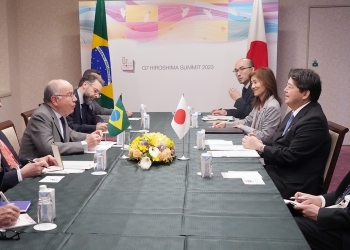Japan-Brazil Relations
Japan-Brazil Foreign Ministers' Meeting
May 19, 2023


On May 19, commencing at 3:15 p.m. for approximately 50 minutes, Mr. HAYASHI Yoshimasa, Minister for Foreign Affairs of Japan, held a Foreign Ministers' Meeting with H.E. Mr. Mauro Vieira, Minister of Foreign Affairs of the Federative Republic of Brazil, who was on his visit to Japan to attend the Outreach Meeting of the G7 Hiroshima Summit. The overview is as follows.
- At the outset, Minister Hayashi expressed his pleasure to have a meeting with Minister Vieira again following the Japan-Brazil Foreign Ministers' Dialogue in Brasilia in January, and Minister Vieira concurred with Minister Hayashi.
- The two ministers shared the view that the whole international community needs to work together in order to uphold a free and open international order based on the rule of law.
- The two ministers confirmed that great potential exists in the bilateral economic relations and that the two countries would strengthen trade and investment ties, including in the digital and green areas.
- Minister Hayashi welcomed the progress in Brazil's accession process to OECD from the perspective of business environment, and stated that Japan would continue to contribute to the process. Minister Hayashi also expressed his hope for the advancement of Brazil's tax reforms, stating that it would stimulate investment by Japanese companies.
- Minister Hayashi stated that it is with pleasure that Japan would actively support the healthcare and other sectors as a Japanese yen loan worth JPY 30 billion would be realized soon, and that Japan would like to continue to work together with Brazil for its early implementation.
- Minister Hayashi expressed his welcome for Brazil's candidacy to host COP30 (30th Session of the Conference of the Parties to the United Nations Framework Convention on Climate Change) in 2025.
- The two ministers exchanged views, among others, on the situations in Ukraine and East Asia. The two ministers also shared the view that the two countries, as non-permanent members of the UN Security Council, would work together and lead Security Council reforms in union as members of the G4.

